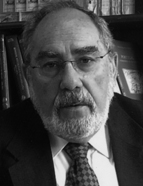

Joaquim Romero Magalhães was an admirable historian whose work is extensive and widely recognised in Portugal, Brazil, Spain and academic circles in other countries. His love of modern history and his role in the growth and affirmation of economic and social history in Portuguese academia were outstanding contributions that he built up at the Faculdade de Economia da Universidade de Coimbra [School of Economics of the University of Coimbra] (FEUC), where he taught and pursued his academic career from 1973 to 2012. Born in Loulé, in the Algarve, he was the son of a high school teacher – the poet and writer Joaquim Magalhães – and a piano teacher at the Faro Conservatory. He attended high school in the Algarve and went on to the University of Coimbra in 1959. The following year, he rejected a place on the law course and opted for history, a path common to many Portuguese historians of that generation.
Romero Magalhães completed his university education at a time of great cultural stagnation, but he had the courage to get involved in student associations and various student movements committed to opposing the Salazar dictatorship. A member of a student republic, he was president of the University of Coimbra Student Theatre in 1963 and president of the Coimbra Academic Association in 1964.
In 1967, he defended his degree thesis at the Faculdade de Letras da Universidade de Coimbra [School of Arts and Humanities of the University of Coimbra]. He presented a bold work on economic and social history, a kind of historical chorography of a peripheral region of 16th-century Portuguese maritime expansion, the Algarve. The book was published in 1970 by Edições Cosmos and stirred the waters of Portuguese historiography, which only then, and with a significant delay compared to other countries, was beginning to pay attention to economic and social history, its methods and conceptual references.
This work is financed by national funds through FCT - Foundation for Science and Technology, I.P, in the scope of the projects UIDB/04311/2020 and UIDP/04311/2020.
